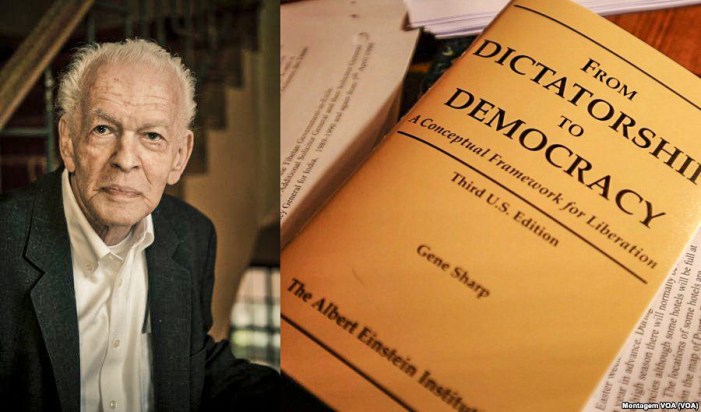This article by Jim Price was posted on the Program on Corporations, Law and Democracy’s (POCLAD) website in May of 2018.
“Dictators are never as strong as they tell you they are. People are never as weak as they think they are.” – Dr. Gene Sharp
Dr. Gene Sharp will best be remembered for his extensive writings on nonviolent struggle. He recently died, on January 28, 2018, at age 90. For almost five decades, Sharp assisted leaders of numerous popular resistance organizations throughout the world as they sought to overthrow dictatorial regimes. Sometimes characterized as the “Machiavelli of Nonviolence” and the “Clausewitz of Nonviolent Warfare,” Gene Sharp was nominated for the Nobel Peace Prize on at least three occasions. He argued that nonviolent resistance draws its strength, not from the capacity of people to “love one another and turn the other cheek,” but from “people’s capacity to be stubborn and cussed, and we’re all good at that”.
After serving nine months in jail for refusing to submit to the draft of soldiers for the Korean War, Sharp, the son of a Protestant minister, came to question the effectiveness of his initial moral pacifism. Having learned the distinction between pacifism and the use of tactics of nonviolent struggle, he wrote his first book Gandhi Wields the Weapon of Moral Power (1960) on the life and works of Mohandas Gandhi. He later studied at the University of Oslo and at Oxford, where he earned a doctorate in 1968.
In the process of honing his philosophy, Sharp corresponded regularly with Albert Einstein. Their collaboration led Einstein to write the preface for his most famous book, From Dictatorship to Democracy: A Conceptual Framework for Liberation (1993). In 1983, Sharp founded his research organization and named it The Albert Einstein Institution. For many years, the Institution has operated out of a small office in Sharp’s house in Boston, Massachusetts. In addition to publishing a number of significant books and articles on nonviolent struggle, he consulted with leaders of democratic resistance organizations on strategic nonviolent struggles in numerous conflict situations. MORE…

